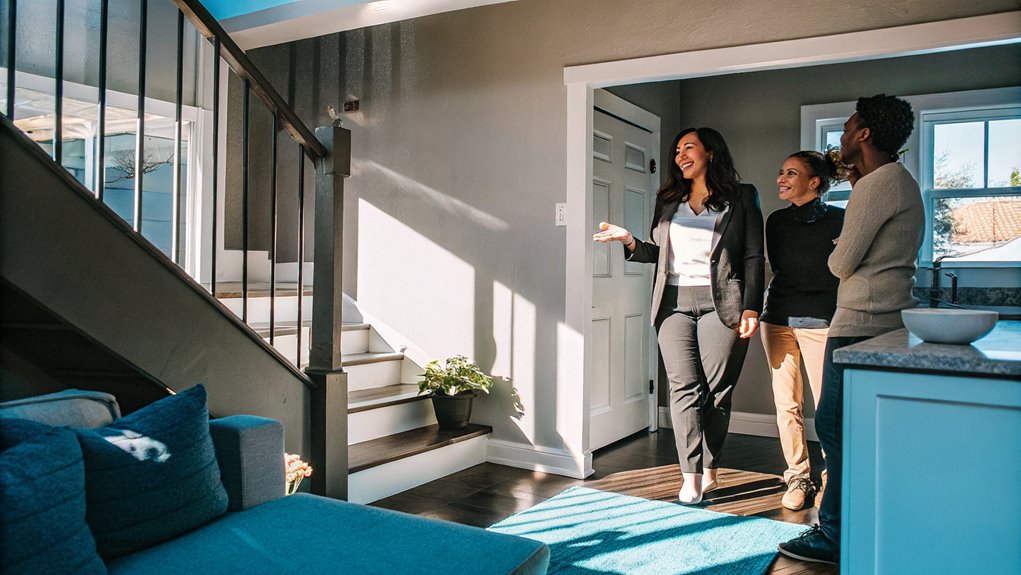Renting out a room in your home can help you make extra money each month. Think about that empty basement or spare bedroom – it could bring in $500 to $1,500! This extra cash can help pay your bills and house costs.
When you rent part of your house, you can save money on taxes too. If you rent half your home, you might get back half of what you spend on house costs.
Before you start, make sure to:
- Pick good people to rent to
- Set fair prices
- Check what your local rules say about renting
Your home can work harder for you when you turn empty spaces into places people want to rent.
Understanding Your Rental Space Options

Renting part of your home can help you make extra money when owning a house gets too costly.
Let's look at ways you can share your space.
Your basement can become a cozy home for a renter. Add a door to the outside, a bathroom, and a small kitchen.
Maybe you have empty rooms upstairs – you can rent these to people who want to stay for a long time or just a few days.
Got a garage? Turn it into a small apartment. If your city allows it, you can also build a tiny house in your backyard for renters.
Before you pick which way to rent, think about:
- How much privacy you need
- How much fixing up will cost
- What your city allows
- How much money you can make
Tax Benefits and Financial Rewards
Renting your home can help you save money at tax time. You can pay less tax by claiming costs like your mortgage, property tax, power bills, and home fixes.
Think of it like this – if you rent out half your home, you can claim half of these costs. You can also get money back for the ads you post, your rental insurance, and cleaning help.
Best of all, your renters give you money each month. This helps pay your bills and lets you save for the future.
Tax Write-Off Opportunities
When you rent out part of your home, you can pay less in taxes. This helps you save money as a landlord.
You can save on your taxes in these ways:
- You can take off some of your home costs. This means things like what you pay for power, water, and house taxes. The amount depends on how much of your home you rent.
- Did you fix something in the rental space? You can take off all of that cost.
- You can take off some of what you pay for home insurance.
- Each year, you can take off some money as your rental space gets older.
All these savings help you make more money from your rental space while paying less in taxes.
Extra Monthly Income Stream
Making extra money from your home is a smart move. You can rent out spaces you don't use and get money each month. Plus, you'll pay less in taxes as a landlord.
You can rent out:
- A room for $500-800 per month
- A basement for $800-1,200 per month
- A garage space for $600-900 per month
- A small home unit for $1,000-1,500 per month
This money can help pay your house loan, fix up your home, or go into your bank account. Rent goes up each year as prices go up in your area.
Your renter will also help pay for water, power, and home care. By sharing your home, you can make money now and build up wealth for later.
Legal Requirements and Permits

Getting Ready to Rent Your Home
You need to check if you can rent out your home. Your city has rules about this. Talk to the city office – they'll tell you what you need.
Here's what to do:
- Get the right permits to rent your home
- Talk to your home insurance company to make sure they cover rentals
- Let your bank know if you want to rent out your home
- Make sure your home is safe for others to live in
You also need to tell the government about the money you make from rent. A tax helper can show you how to do this the right way. They can help you save money and keep good records.
Keep all papers about your rental in a safe place. This helps you follow the rules and stay out of trouble.
Setting the Right Rental Price
Finding the right rent price is like solving a friendly puzzle. First, look at what other homes near you cost to rent. Check homes that look like yours – with the same number of rooms and features.
Think about what you have to pay each month. This means things like water bills, fixes around the house, and any fees. If you have a house payment, add that too.
Watch how many people ask about your rental. If lots of people call you, your price might be too low. If no one calls, you might need to lower the price.
Remember that prices can go up or down during different times of the year. This is very true if you live near a college or a place where lots of people go on vacation.
Screening and Managing Tenants

Looking for good tenants? Here are three key steps:
- Check their past behavior
- Look at how well they pay bills
- Make sure they've a job
When you share your home with others, you need clear rules that work for everyone.
Here's how to be a good landlord:
Make a clear house agreement that shows:
- When rent is due
- House rules everyone must follow
- Who fixes what when things break
Take pictures of your home before new people move in. Write down how everything looks.
Set up easy ways to:
- Collect rent
- Handle fix-it requests
- Keep track of papers
Make clear rules about:
- Quiet time
- Visitors
- Where to park
- Using shared spaces
Remember: You're sharing your home. Be firm but kind. Listen when people have problems and fix issues quickly.
Preparing Your Space for Rentals
Get your rental space ready by making it clean and pretty. Think about what your renters will need and like. Make sure everything works well and looks good.
Write down clear rules about what renters can and can't do. This helps stop problems before they start.
Your rules should say:
- How loud is too loud
- Who can visit
- Who cleans what
- How to use shared spaces
- What spaces and things renters can use
Good rules help you and your renters get along better.
Clean and Stage Effectively
Your home needs to look clean and feel good to get the best renters. Think of it like getting ready for special guests.
Start by cleaning every part of your home. Make sure all the lights, taps, and other things work well.
To make your space ready:
- Take away your own stuff and use simple, nice items most people will like
- Get good sheets, soft towels, and basic items that make the place feel better
- Take bright, clear photos that show off the best parts of your home
- Make the kitchen and bathrooms extra clean since people use them a lot
Set Clear Rental Rules
Living with renters is easier when everyone knows what to do. A good way to start is to write down all the house rules. Think about when quiet time should be, how to share spaces, and who can visit.
Make sure to write down all the basics:
- Where to park your car
- When to do laundry
- How to keep the house clean
- Who pays for power and water
- When rent is due
Safety is key too. Give each person their own key. Tell them which rooms they can use and which ones they can't. Let them know if smoking is okay or not, and if they can have pets.
Talk about overnight guests too.
Write all these rules down and have everyone sign them. This keeps you and your renters happy. It also follows the law, which is very important. When rules are clear, everyone can live better together.







